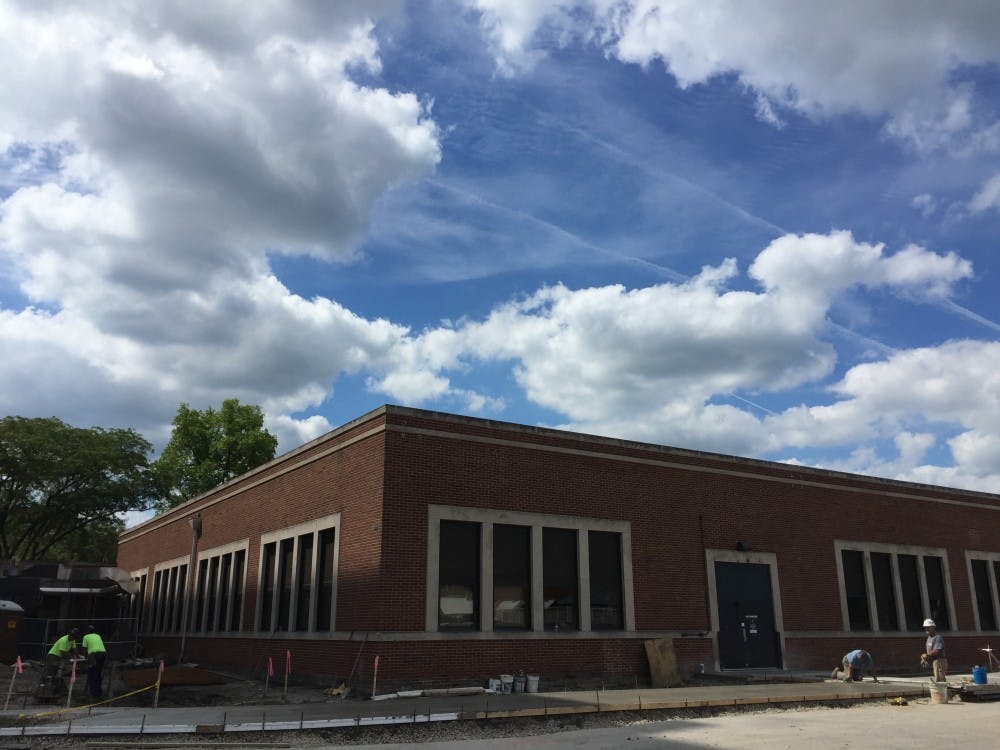According to the Bureau of Labor Statistics, the average annual salary with a constructional management degree is $94,590 as of 2014. There are many different levels of construction management, including those who work for themselves as small business owners and those who oversee large teams, earning millions of dollars every year.
Ball State has opened a center to help prepare construction students for a future in a rapidly expanding field.
In April, the university hosted a ribbon-cutting ceremony for the Robert G. Hunt Center for Construction Management, a 2,500-square-foot facility designed to replicate the office environment found at major construction management organizations.
The center is a learning lab for teamwork, said James Jones, a construction management professor.
“It is designed to simulate current office situations, so the whole idea is that there is integration, collaboration and teamwork,” Jones said. “That’s really one of the focuses of our major — they will be working along with both other construction professionals as well as designers, owners and other professionals. Everything in there is based on a team concept.”
One of the facility’s primary uses will be for the program’s capstone course, which focuses on students working in four-member teams on a construction project, according to bsu.edu.
Starting this fall, each student team will have its own physical office space for the duration of the course. Students will have around-the-clock access to the center to work on assignments.
Grant King, a junior construction management major, won't be doing his capstone course until next year, but he said he's still excited to start using the new building.
"I know I have a class that has at least one big group project in it, and the new center will be a much better place to meet than the library. ... It'll be good for everyone," King said. "I haven't really been in and looked around yet, but I'll probably rather go there than anywhere else to work on homework."
The center’s name honors the program’s strongest supporters, Diane and Robert G. Hunt, ’69, according to bsu.edu. Robert (Bob) Hunt is a national leader in innovation and excellence in the construction industry and has been an executive-in-residence for two immersive learning projects at Ball State.
The concept of the building was inspired by Hunt, Jones said.
“One of the things that [Hunt] and industries have always emphasized is the relational aspect that buildings are built by teams, so we built that into the layout of the space,” Jones said. “There was also some flair — the lights were designed based off the colors of Bob’s ties, which are always known to be quite colorful.”
The actual ribbon-cutting ceremony was the first time Hunt had seen the center, but Jones said he was very impressed and excited for the program.
The Robert G. Hunt Center for Construction Management has impressed more than just Hunt, though. Incoming students are excited for the new building.
“The center has helped our recruiting already,” Jones said. “Students and parents are very impressed with our space. It’s beautiful, distinctive and different than anything else along anyone else’s campus.”
The program’s employment and placement rate also plays a large factor in attracting students.
Employment for construction managers is projected to grow a total of 5 percent from 2014 to 2024, according to the U.S. Bureau of Labor Statistics.
In addition to the expected industry growth, there will be a growing need to fill vacancies due to baby boomers retiring, according to bsu.edu. Ball State’s program had a 100 percent placement rate in 2015, with recent graduates starting at an average salary of $53,000.
While Jones said he has not quite calculated the numbers as far as salary, he said the program did also have a 100 percent placement rate in 2016. In fact, Hunt Construction Group hired the entire capstone team from last year, which Jones said is “a success story for placement.”
The new year brings new opportunities for the center, which is exciting not only for students but also Ball State University.
“We are excited for the new, full year,” Jones said. “This [center] distinguishes our program from some of the other accredited programs in the state, and it fits our immersive learning mold as well as Ball State’s take on construction management.”
|
|
|
According to the Bureau of Labor Statistics, the average annual salary with a constructional management degree is $94,590 as of 2014. There are many different levels of construction management, including those who work for themselves as small business owners and those who oversee large teams, earning millions of dollars every year. |





